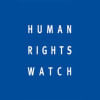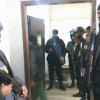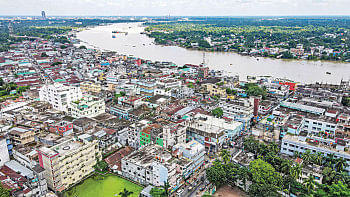Return of enforced disappearance and extrajudicial killing?

It was a sombre occasion at the Dhaka Reporters Unity premises on April 30. At a press conference, Yasmin Nijhum claimed that a group of men in plainclothes introducing themselves as members of a law enforcement agency picked up her 44-year-old husband Mohsin Gazi from the city's Shewrapara area on April 19. She further informed that the family was advised by the perpetrators that since her husband would be returned within three days, they need not report the matter to any authority. More than 10 days after his disappearance, as Mohsin did not return and his loved ones had no information about his whereabouts, Nijhum made a fervent plea at the press conference that at least Mohsin "should be shown arrested".
Nijhum reported that at around 2:45am on that day, a group of six to seven men came in three white microbuses to their house. Their landlord was informed by the group that they had come to pick up Mohsin and claimed to have an arrest warrant issued against his village address in Bhola (it was neither shown nor presented to the family). One of the men displayed an identity card. However, when Nijhum's brother took a photo of the card, he was forced to delete it and reset his phone. Nijhum claimed that the police refused to file any case and only agreed to register a general diary, that too "on condition that no law enforcement agency will be mentioned in the document", Nijhum alleged. The officer in charge of the Kafrul police station declined to comment on the allegation that they had asked the family not to mention any enforcement agency's name in the GD.
The press conference was a prompt and bold expression of solidarity by the members of Mayer Dak with the family of Mohsin, the latest victim of alleged involuntary disappearance in Bangladesh. Soon after the outbreak of the news of his disappearance, the Mayer Dak leadership convened the press conference to spread the message about the latest victim and exert pressure on the authorities that Mohsin be produced before the court or at least shown arrested as demanded by his spouse. At the press conference, the family stressed that they had credible information that the victim was in custody of a particular unit of an elite law enforcement agency in Dhaka. Throughout the day, despite such brave claims, the state agency maintained a stoic silence.
A day after the press conference, Mohsin was "shown arrested", curiously by Rab 8 in the faraway southern town of Barishal. The commanding officer of Rab 8 pleaded ignorance of the claims that the family had made about him being involuntarily disappeared from his Dhaka residence. A press release by the unit stated that Mohsin Gazi was found in a mahogany orchard based on a "tip-off" as he and his "accomplice robbers" were taking shelter there "carrying illegal and locally made weapons". A number of items including cleavers, pistol, shooter gun, rifle and several bullets were claimed to have been recovered from the group. Rab also brought about allegations of extortion, theft, intimidation, abduction and hostage taking against "Mohsin and his gang".
While the charges against Mohsin are matters for the police to establish in the court of law, questions abound. For example, how can an individual who was allegedly apprehended by a team of six or seven persons claiming to be members of a law enforcement agency (with at least one person displaying identity card)—using at least three similar microbuses, in the wee hours of the morning, from the middle of Dhaka city, after informing the landlord and the members of the family of the apprehended individual about the purpose of their mission, and promising to bring him back in three days, with the individual essentially being involuntarily disappeared for more than 10 days, only to be discovered in the southern city of Barishal—be involved in a conspiracy with weapons along with a group of accomplices in a mahogany orchard? While the concerned unit of the law enforcement agency may feel confident with the crafted narrative, discerning observers would find such claims to be preposterous and derisory. There is little doubt among the members of the family and those who witnessed the arrest of Mohsin in Shewrapara on April 19 that he was involuntarily disappeared. Surely, he remained outside the protection of the law during the interim period.
The US sanctions on Rab and seven of its key current and former officials have irked, if not rattled, the Bangladesh government. Unfortunately, the Bangladesh government has continued to deny knowledge of or involvement in such phenomena. In line with this approach, it termed the US move as "outlandish" and "regrettable" and its foreign minister publicly solicited Indian support to get rid of the sanctions.
There was a sharp drop in the number of incidents of both alleged involuntary disappearances and extrajudicial killings after the imposition of the sanctions, bringing relief among the citizenry. The Mohsin Gazi episode appears to have brought an end to that feeling of respite. The lull that accompanied the US sanctions (imposed on December 10, 2021) on grounds of alleged extrajudicial killings also appeared to have come to an end when one Raju, 35, succumbed to Rab action in Cumilla on April 18. In a separate case, Kawser Ali Mondal (45) of Joypurhat died after a shootout with Rab in Manikganj four days later. The Rab claimed it had to open fire as the force came under attack by the miscreants. While members of law enforcement agencies are indisputably justified to take stern action if they come under attack, including using firearms, one is perplexed as to why ordinary individuals would be coerced to sign documents by state agencies to declare that they had "witnessed gunfight", whereas in reality, they had not seen any such occurrence. Two witnesses of the case, Rifat Mahmud (20), and Saiful Islam (37), a CNG driver, had to sign documents at Rab's prodding, but admitted to the press that although they had seen a dead body, they were not witness to any gunfight. The locals also reported that they were not aware of any incident of gunfight with the Rab either (The Daily Star, April 22, 2022). These grievous incidents in the third week of April 2022 are indeed alarming.
At the Mayer Dak press conference, family members of at least a dozen disappeared persons demanded information about their loved ones along with that of Mohsin. They asked why members of law enforcement agencies refuse to furnish their identity documents and arrest warrants when they come to apprehend such individuals, why the police refuse to take cases when family members specifically name and identify the perpetrators, why the authorities do not investigate properly, and why the public representatives do not discuss such flagrant violations of rights on the floor of the parliament. If the claims by the government that its functionaries are not engaged in such heinous practices are tenable, then does the onus not rest on the state to account for more than 600 cases of involuntary disappearances over the last decade or so? The unwarranted and unsubstantiated statements of senior functionaries of the state including ministers that the victims are "hiding" after swindling in business, or after extramarital affairs, or have gone overseas without the knowledge of the family and the like, are an affront to victim families' sentiments. The families challenged the authorities to prove a single such case.
Bemoaning the disappearance of her husband, a wife said, "they have taken away the roof from over my head". Years have passed by, yet many families do not know whether their loved ones are dead or alive. "If he has gone, then I would like to hold a milad (the last rite)", said one mother. "At least they should show us his final resting place", was the desperate plea of a father. A boy wanted to know why his father does not accompany him to his school like his other mates. Likewise, little Lilly wanted her father to choose her dress for the then-upcoming Eid, a wish that will never come to fruition. Other family members highlighted mundane aspects of their lived experience without their loved ones. "My husband was in timber trade and we have enough savings in bank to tide us through. But we cannot access the money as we cannot get a succession certificate and thus have to live on the charity of my extended family", narrated another wife. Property settlement of many households remains pending for the same reason.
The failure of the mainstream society to extend moral support to the victim families is palpable. The decision of the National Press Club authorities to deny permission to use the venue for the Mayer Dak press conference only reflects the level of impediment and non-cooperation that these families face. Likewise, the silence of the mainstream civil society, the keepers of national conscience, on such gross violations of human rights is an affront to the spirit of the Liberation War. The time has come for the state to account for the whereabouts of every involuntarily disappeared person and, instead of trying to secure external support to remove sanctions, set up an independent and credible investigation in all cases of involuntary disappearances and extrajudicial killings.
CR Abrar is an academic and a member of Nagorik, a platform for human rights and the rule of law.

 For all latest news, follow The Daily Star's Google News channel.
For all latest news, follow The Daily Star's Google News channel. 








Comments